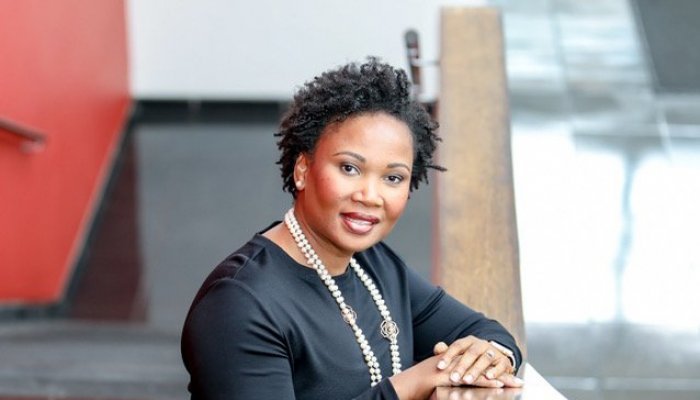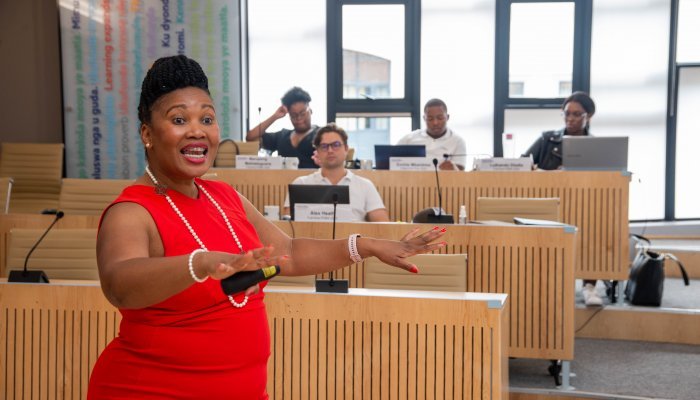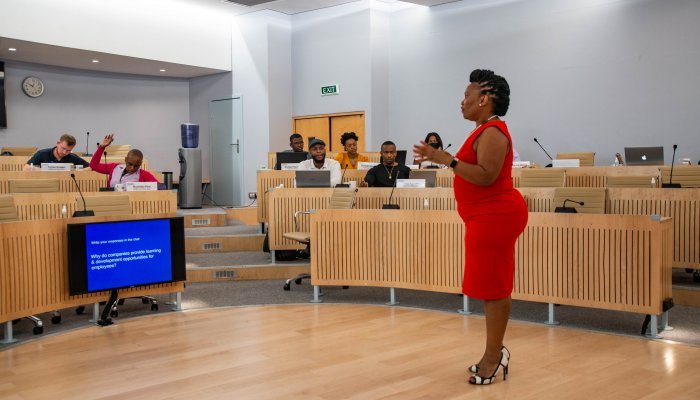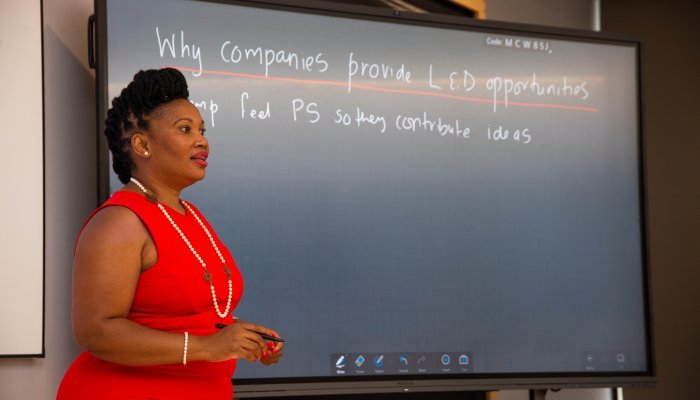As one of the fastest-growing higher education subsectors in Africa, business management education continues to be relevant in a post-pandemic world. This is despite global criticism of the industry following the great recession around issues such as the proliferation of easier MBA programmes, dwindling relevance of existing curricula in a changing digital world, and the leadership deficits exposed after 2008.
To be fair, there was some tinkering around the edges before the 2020 global pandemic began, particularly around curriculum updates, but for the most part, management education institutions were caught wrong-footed by the SARS-Cov-2 outbreak. Nevertheless, Covid-19 has been revolutionary, cutting higher education off at the knees and forcing a rethink around the nature of education, pedagogy and educational spaces, the needs of students and relevance of programmes, and how learning should take place for optimum impact.
Among the areas that have come in for scrutiny is a widespread concern that the methods, designs and pedagogy being used are outdated, or at the very least that they favour particular schools and faculty. Another concern is that the existing model is both elitist and exclusionary. One of the worst criticisms is that Africa has mostly just copy-pasted the western model and offered that up to students under the guise of a good education. The colonial undertones of this model have been particularly problematic.
Faced with these structural inadequacies, alongside the physical constraints brought on by Covid-19, business education providers and business schools, in particular, have been forced to make some courageous changes over the past two years – changes we’d been too complacent to make before.
This new-found urgency is something we need to harness if deep-seated and valuable innovation is to take place across multiple levels.
The proximity level
Last year, in the Africa Journal of Management, a collaborative article written by academics from Egypt, South Africa and Canada interrogated the impact of the pandemic in the context of Africa’s business management education. The authors argued that business schools should be aligning pedagogy to the worldview and experiences of students rather than just the businesses they serve. This would require far greater proximity to students.
There are two components to proximity that we need to consider. One is the psychosocial aspect, which relates to the meaning we attach to being in relationship to each other, where we belong and how we see ourselves. In management education, it requires us to rethink norms, rules and values. Working and learning from home led to isolation. So, how can we build greater opportunities for engagement and collaboration? We are required to show more flexibility, compassion, and empathy. The second is physical proximity – something Covid-19 well and truly messed up over the past few years. As a result of the pandemic, we are now being pushed to examine how teaching and humanity are impacted through digital means. In business education, we are being challenged to create physical closeness through the intelligent use of technology so that we can learn and work together, rather than separately and individually. The outcomes of doing so are more powerful.
The personal level: It’s time for more humanity
In the classroom, a humanistic outlook should show compassion and empathy for students and their circumstances. It’s an approach that hinges on appreciating the importance of well-being and factoring this into how we design more inclusive, flexible, appreciative, and encouraging educational offerings.
Psychological safety is an interesting aspect of this shift, which talks not only to mindfulness training, wellness programmes and mentorship but also to a fundamental power shift between students and institutions of higher learning and between employees and employers. In the same way companies are struggling to get employees back to the workplace, so too are business schools battling to get students back on campus. This exercise of personal autonomy is at the heart of this power dynamic.
Of course, a return to the campus is not where humanity in business education ends. In fact, it’s only the beginning. Business schools must increasingly model how business leadership should look in the future by helping to develop the human capacities and human orientation that will increasingly be demanded of leaders in the future. It is no longer sufficient only to develop leaders cognitively; we need to grow ‘head, heart and hands’ – in other words, whole individuals who integrate their thoughts, feelings, body, relationships and connectedness practices. Only this type of disruption will instil in our technocrats and business leaders a sense of urgency to create workplaces of meaning and humanity that can withstand the onslaught of change, crisis and disruption.
The year-long GIBS MBA Applied Business Project, which asks MBAs to solve a social problem encompassed within the United Nations’ Sustainable Development Goals, is a great example of how to embed humanity and empathy into future leaders, as well as an appreciation for the importance of social impact and sustainability thinking.
The leadership level: More heart, less head
In an article published on the Association to Advance Collegiate Schools of Business (AACSB) website, Gregory Whitwell, the dean of the University of Sydney Business School, shared insights from the global alliance in management education (CEMS) report on leadership in a post-pandemic world. The upshot was that Covid-19 had caused leaders to “question the status quo and rethink their business-as-usual assumptions”.
Among the skills gaining relevance and importance, Whitwell singled out openness, empathy, resilience, and the ability to communicate. Notably, the report showed that while core human skills were in demand, the 1,711 individuals interviewed from 71 countries placed slightly less importance on strategic vision (down from 73% pre-Covid to 68%) and technical skills (down to 7% from 13% previously). This demonstrates that we are living through a readjustment in our thinking where ‘head stuff’ is becoming less important while human skills are more important.
This may seem at odds with the technological direction the world is taking, but, as Whitwell puts it, “This change in priorities also reflects our very human tendency to achieve balance, particularly when our world has been so fundamentally disrupted.”
The innovation level: It’s not just about tech
In a series of articles produced by the OECD in 2021, which aimed to show how the pandemic would forever change the world, several business school deans were interviewed from as far afield as Nigeria, Mexico, China, Egypt and America. What came across strongly was the heightened digital transformation that had taken place due to Covid-19 and the use of platforms like Zoom and Microsoft Teams, and the seemingly overnight upskilling of faculty.
It is easy to get bogged down in tech talk when discussing the innovations in management education, but this is not the most far-reaching shift facing business institutions. If you want a clearer picture of how business education will continue to evolve, look no further than the spin-off of micro-credentials and industry-related certifications. These are quick courses students can access via Coursera and LinkedIn Learning, for example. After eight, sixteen or sometimes twenty hours, a student can walk away with a certificate.
Universities are increasingly being challenged by this new, quick and user-friendly approach to learning. So much so that the Courseras of this world are now becoming legitimate competitors as people seek to upskill quickly and affordably.
To keep up, traditional business schools have to become as technologically slick as these agile competitors, building in the layers of flexibility that students now demand as part of their time management expectations. This requires essential new roles – such as the session producers who came on board at GIBS in April 2020 to help lecturers manage the online classroom – and will continue to require adaptation as lecturers now face a hybrid reality that straddles both live and digital students.
In 2021, a GIBS team headed by Hayley Pearson was listed among the finalists at the Business Education Innovation Awards by innovation learning hub LearnSpace in Paris for an exciting gamified-enabled learning programme to come out of GIBS, which aimed to impart knowledge and work-readiness skills to new graduates and early career professionals. What was particularly novel about the ‘Differentiate’ course was that it included a virtual internship where students could apply their newfound knowledge and skills by undertaking activities on the game-based platform.
The ecosystem level: New partnerships and models
In the early days of the pandemic, Professor Owen Hall from the Graziadio School of Business in America wrote that leaning only on online programmes and slashing – sometimes up to 50% – pricing to try to compete with micro-credentials was not a viable, long-term solution for any business school. Instead, management education institutions needed to focus on being both economically viable and competitive.
Drawing on the work of the AACSB, Hall argued that “business schools should consider forming strategic global partnerships, which have the potential for improving operational efficiencies, thus resulting in a competitive advantage. These strategic partnerships can foster collaboration across many dimensions, including business schools, business entities, research associations, governments, and third-party providers.”
Indeed, the list of potential partnerships is endless and even includes collaboration through initiatives such as the Principles for Responsible Management Education, which holds member business schools to their commitment to champion responsible management education that embeds a sustainable, positive social impact into both teachings and research. This commitment also extends to how educators such as myself fulfil our role in helping to revisit old ways and transform our institutions into more relational, social and connected places of learning.
When you look at the levels of potential impact and innovation swirling around the management education space, it is fair to say that quality institutions of higher learning have the potential to look vastly different in the years to come.
The big risk
The rapid shift to online teaching and digital learning was one of the most widely touted innovations to come out of the higher education space during Covid-19. Even as face-to-face teaching recommences across the world, this new facet of learning will remain with us, underpinned by new hardware and software technologies, and faculty and curricula that are increasingly in sync with both in-person and remote teaching.
There is, however, a big risk associated with this rapid digital transformation. Unless business schools are mindful, this shift could entrench inequality and undo opportunities for inclusion.
Early on in the pandemic, GIBS was working on the assumption that all of our students were employed, could afford data and were comfortable using digital platforms. We were wrong. Many students didn’t have reliable connections and couldn’t afford the added expense. Plus, we had to factor in the impact of loadshedding on connectivity. To ensure that the quality of education these students were receiving was not compromised, GIBS invited any student to come to campus and access free WiFi from the safety of their own vehicles. If they didn’t have a car, we would arrange for a socially distanced workspace.
This lesson underlined the importance of understanding the individual context of the entire student body. Unless these needs and challenges are taken into account, all the technological bells and whistles in the world will not help people learn.
Dr. Dorothy Ndletyana, a Fulbright Scholar, joined GIBS in 2017 and holds the position of senior lecturer. She leads the MPhil with a specialisation in change leadership. Her research, teaching and consulting interests span humane-centred leadership, human resource management, human behaviour and organisational development. Through Ndletyana Learning, a boutique consulting practice, Ndletyana offers a range of services to a niche client base, including organisational development and talent management, integral coaching and design, and the development and facilitation of deeply transformative interventions.









